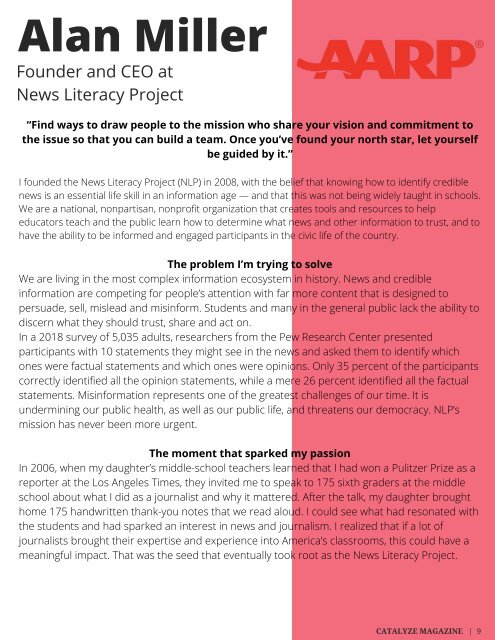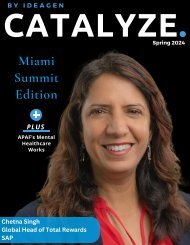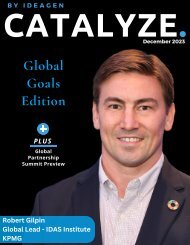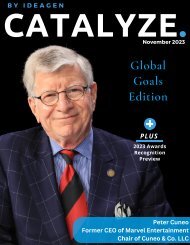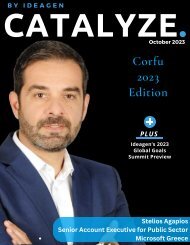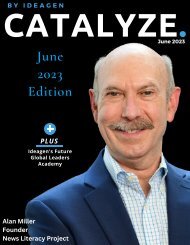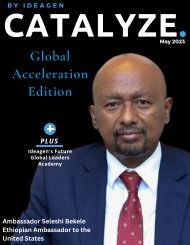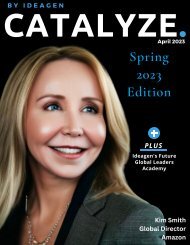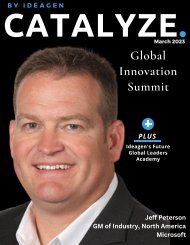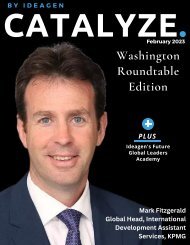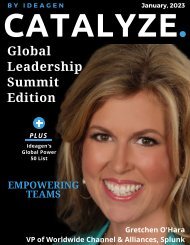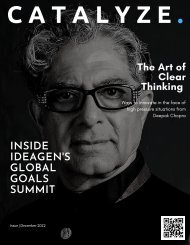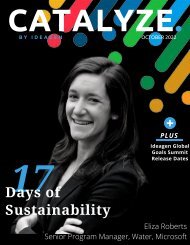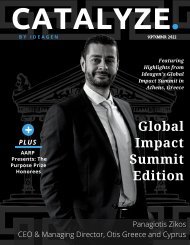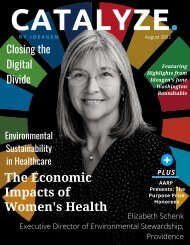Catalyze Magazine March 2022
With Ideagen's extensive member network and influential platform, Catalyze Magazine serves as an aggregate for all the content, events, articles, and collaboration that we do. It is a monthly magazine where you will find transcriptions from Ideagen events, content, articles, and information surrounding how we are completing our mission. With this magazine, we want to highlight the nature of cross-sector collaboration and how we infuse it into our daily mission on a global scale. This edition of Catalyze Magazines highlights the Washington Roundtable and Global Leadership Summit. The first part of each article in this edition of Catalyze Magazine is available, please sign up at Ideagenmember.com to continue reading and stay up to date with our monthly releases.
With Ideagen's extensive member network and influential platform, Catalyze Magazine serves as an aggregate for all the content, events, articles, and collaboration that we do. It is a monthly magazine where you will find transcriptions from Ideagen events, content, articles, and information surrounding how we are completing our mission. With this magazine, we want to highlight the nature of cross-sector collaboration and how we infuse it into our daily mission on a global scale. This edition of Catalyze Magazines highlights the Washington Roundtable and Global Leadership Summit. The first part of each article in this edition of Catalyze Magazine is available, please sign up at Ideagenmember.com to continue reading and stay up to date with our monthly releases.
- No tags were found...
You also want an ePaper? Increase the reach of your titles
YUMPU automatically turns print PDFs into web optimized ePapers that Google loves.
Alan Miller<br />
Founder and CEO at<br />
News Literacy Project<br />
“Find ways to draw people to the mission who share your vision and commitment to<br />
the issue so that you can build a team. Once you’ve found your north star, let yourself<br />
be guided by it.”<br />
I founded the News Literacy Project (NLP) in 2008, with the belief that knowing how to identify credible<br />
news is an essential life skill in an information age — and that this was not being widely taught in schools.<br />
We are a national, nonpartisan, nonprofit organization that creates tools and resources to help<br />
educators teach and the public learn how to determine what news and other information to trust, and to<br />
have the ability to be informed and engaged participants in the civic life of the country.<br />
The problem I’m trying to solve<br />
We are living in the most complex information ecosystem in history. News and credible<br />
information are competing for people’s attention with far more content that is designed to<br />
persuade, sell, mislead and misinform. Students and many in the general public lack the ability to<br />
discern what they should trust, share and act on.<br />
In a 2018 survey of 5,035 adults, researchers from the Pew Research Center presented<br />
participants with 10 statements they might see in the news and asked them to identify which<br />
ones were factual statements and which ones were opinions. Only 35 percent of the participants<br />
correctly identified all the opinion statements, while a mere 26 percent identified all the factual<br />
statements. Misinformation represents one of the greatest challenges of our time. It is<br />
undermining our public health, as well as our public life, and threatens our democracy. NLP’s<br />
mission has never been more urgent.<br />
The moment that sparked my passion<br />
In 2006, when my daughter’s middle-school teachers learned that I had won a Pulitzer Prize as a<br />
reporter at the Los Angeles Times, they invited me to speak to 175 sixth graders at the middle<br />
school about what I did as a journalist and why it mattered. After the talk, my daughter brought<br />
home 175 handwritten thank-you notes that we read aloud. I could see what had resonated with<br />
the students and had sparked an interest in news and journalism. I realized that if a lot of<br />
journalists brought their expertise and experience into America’s classrooms, this could have a<br />
meaningful impact. That was the seed that eventually took root as the News Literacy Project.<br />
CATALYZE MAGAZINE | 9


